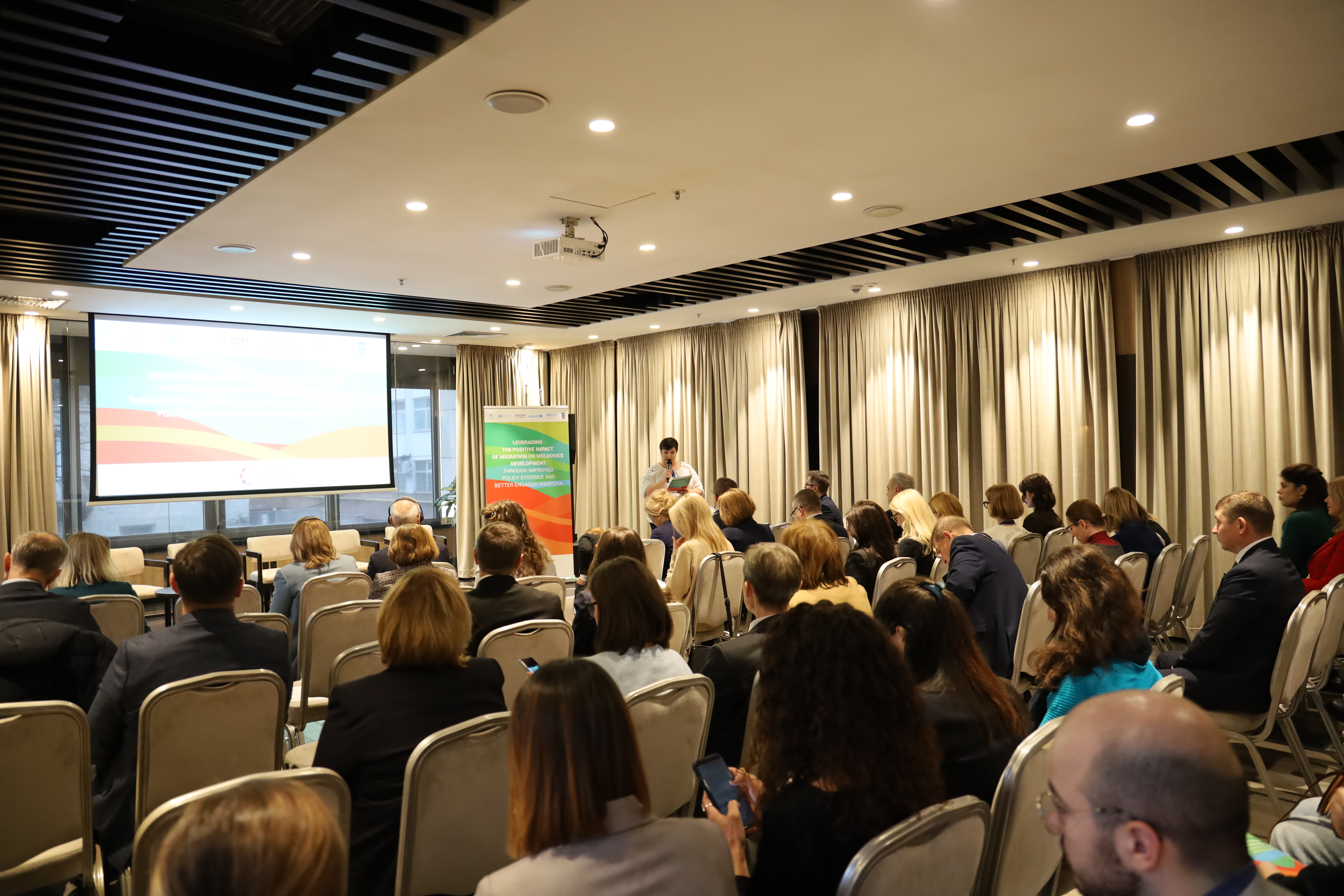Joint UN Moldova Migration Multi-Partner Trust Fund Programme which aims to leverage the positive impact of migration launched in the Republic of Moldova
December 18, 2023

The Joint UN Moldova Migration Multi-Partner Trust Fund Programme was launched during an event in Chișinău, in the context of the International Migrants Day 2023. Implemented for a period of 36 months by the International Organization for Migration (IOM), the United Nations Development Programme (UNDP), the United Nations Children's Fund (UNICEF) and the World Health Organization (WHO) in partnership with the Government of the Republic of Moldova and financed by the UN Migration Multi-Partner Trust Fund Programme (MMPTF), the joint Programme aims to leverage the positive impact of migration on Moldova’s socio-economic development and minimize the negative effects of migration.
The launching workshop, structured into 4 thematic sessions, joined by over 50 participants representing central public authorities, UN Agencies, international partners, civil society, academia, diaspora representatives – presented and discussed challenges, opportunities, priority actions of both public authorities and UN Agencies in the Republic of Moldova in the field of diaspora engagement, labour migration and immigration management.
The participants of the event approached current challenges, existing options and opportunities for ensuring effective migration policy design and management in the context of EU integration of the country. As well, the audience came to a shared understanding that the joint programme is being implemented in support to and in strong partnership with Moldovan Government to advance sustainable cooperation between and mutual engagement of the central and local authorities, diaspora groups and migrant communities, expert community, academic sector, and youth.
Ana Calinici, State Secretary of the Government, mentioned in her opening remarks that she welcomes the launching of the joint programme as it is strongly supporting the Moldova’s modernization and the EU integration with its implementation strategy, data and capacity building components, sustainable and innovative approaches aligned to this process.
As underlined by the participants, while the country is advancing vividly towards EU accession, there are still significant challenges that need to be addressed in a coordinated manner. The speakers, representing the UN implementing partners – IOM, UNDP, UNICEF and WHO – presented, during their interventions, practical approaches on how the programme could support in addressing some of the identified challenges in a more coordinated manner employing international expertise and know-how which were developed by Moldovan diaspora and can be valorised for advancing the reforms in key sectors.
The opportunities and innovative models for upgrading the national data systems, designing sustainable and operational platforms to enable physical and virtual diaspora dialogue and engagement, including through short- and long-term return to Moldova of graduates, highly skilled migrants and diaspora entrepreneurs in priority areas for Moldovan development, at the national and local levels - were presented and discussed. There was a joint agreement that once implemented in Moldova they will act as catalysts, expediting the progress of key national goals by leveraging data, engaging diaspora communities, and tapping into the diaspora owned expertise to drive sustainable development in Moldova.
"Today’s launch of the joint programme in migration area is another good example of UN agencies working together to support the country’s efforts to deliver a better life for all, leaving no one behind. Addressing key challenges, leveraging the expertise of the diaspora, and exploring new opportunities for Moldova will definitely bring a positive impact on the country’s sustainable and resilient development,“ mentioned Simon Springett, UN Resident Coordinator to the Republic of Moldova.
Lars Johan Lönnback, IOM Chief of Mission, mentioned that the “the diaspora’s collective experience and skills offer a wealth of potential to drive positive change, particularly in critical areas such as labour mobility, social protection, healthcare, education energy efficiency, climate change adaptation, digitalization, investment attraction, public finance, justice, and the rule of law, among many others”. He also mentioned that “our shared vision is that a revamped migration governance framework shall be an integrative part of the EU integration process, and it needs to be informed by unbiased and gender sensitive data and analysis which considers migrants and diaspora needs, vulnerabilities, as a well as the migrants’ and diaspora competences and know-how which can and should be leveraged for Moldova’s development in key strategic sectors”.
“With the recent decision by the European Union to open negotiations for Moldova's accession, the importance of aligning skill development with the expertise offered by our diaspora becomes even more pronounced. As part of the joint programme, which is being launched today, UNDP will support national authorities to develop a nationally owned and sustainable platform for diaspora dialogue and engagement in public governance and development opportunities to support acceleration of the national development. We will also pilot a mechanism for temporary return to Moldova of highly qualified practitioners in priority areas for development, at the national and local levels,” said Andrea Cuzyova, UNDP Deputy Resident Representative to the Republic of Moldova.
Maha Damaj, UNICEF Representative in the Republic of Moldova, said: "The migration phenomenon mainly affects Moldovan families with children. More than 25% of households with children, where at least one member is abroad, fall into the socially vulnerable population category. On the other hand, the impact of migration could effectively serve as an investment in enhancing the lives of Moldovan families with children, for example, by using wisely remittances sent by Moldovan people staying abroad. As part of this joint project, UNICEF will collaborate with the Government and UN agencies to ensure that global mobility trends positively impact children's needs."
As part of the event, the first meeting of the programme’s Steering Committee took place, during which the Steering Committee members approved the Regulation of its operation, the list of members and the multi-annual plan for the implementation of the programme.

 Locations
Locations



